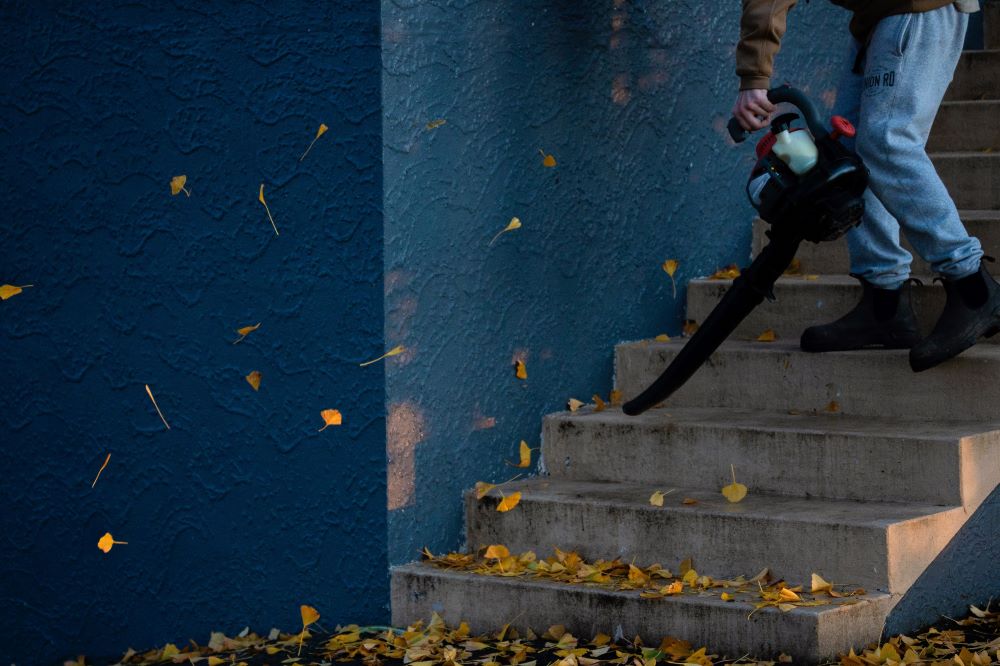
(Unsplash/Callum Hill)
On fall mornings in our Maryland neighborhood, the gas-powered leaf blower drone starts early and continues all day. When a trailer hauling the things inevitably arrives on our street, the drone transforms into a roar. I then angrily close my windows despite the perfect autumnal air, but it doesn't really help because these things blare with a frequency so low and so loud that the sound easily blasts through the panes and rattles your bones.
The sound is worse — even dangerous — for the operators themselves, usually landscaping crew members who often face under protected working conditions. Permanent hearing loss and difficulty noticing the sound of approaching cars in high-traffic areas are just two risks for landscapers who use leaf blowers. As with so many injustices, those who are already on the margins of society face the most severe impact.
Noise is not the only problem with these monstrosities. They're also a terrible source of air pollution. Gas-powered blowers operate on such old, bad technology that they spew as much pollution into the air in a single hour of operation as a Toyota Camry emits over an 1,100-mile drive.
There is only one option here: Ban them. Get rid of them forever. They are bad for the environment and bad for people. Let us beat our swords into plowshares and our gas-powered leaf blowers into rakes. (Or at least swap them out for battery-powered options.)
As we work to change laws, we can also try to change hearts.
Sometimes, the work for environmental justice can feel overwhelming because there is so much to do, so many powerful players blocking progress and so many problems to address. But this is a slam dunk on a 4-foot kiddie basketball hoop.
The movement to get rid of gas-powered leaf blowers has accordingly taken off all over the place. More than 100 U.S. towns and cities have banned them outright. Popular opinion is shifting: As one journalist put it, gas-powered leaf blowers "are viewed about as favorably these days as smoking indoors."
One of the best campaigns to ban the blowers happened just down the street from my neighborhood. If you travel 5 miles from my house in Maryland to Washington, D.C., the gas-powered leaf blower drone will stop. They were banned there in 2018.
How did they pull it off? Journalist James Fallows, formerly of The Atlantic, has been connected to the D.C. ban as a neighborhood activist and has chronicled the effort in his email newsletter. The District's ban, which passed by a unanimous city council vote on environmental justice grounds, had a three-and-a-half year phase-in time, allowing contractors and individual citizens to adjust. The machines break down so quickly that the phase-in window was long enough for users to need replacements anyway. Also, D.C. offered rebates to companies and individuals who purchased battery-powered replacements. In short, it's working.
If the data and success stories aren’t enough to inspire action, Pope Francis' encyclical Laudato Si' lends some moral authority to the "ban the blowers" movement. He talks about the specific problem of noise pollution in two different paragraphs. And his emphasis on what he calls "integral ecology" is a reminder that what hurts the environment also usually hurts those who are most poor. Fallows, the journalist, writes strongly on this point: "The people breathing [gas-powered leaf blower] fumes all day, and being battered by high-decibel sound within inches of their ears, are disproportionately low-wage and often non-English-speaking. They’re sacrificing themselves to keep some customer's lawn pristine."
Francis in Laudato Si' also calls us to think beyond our own personal choices, as important as those are, and to get involved with community-level environmental justice efforts. "Along with the importance of little everyday gestures, social love moves us to devise larger strategies to halt environmental degradation and to encourage a 'culture of care' which permeates all of society," Francis writes. "When we feel that God is calling us to intervene with others in these social dynamics, we should realize that this too is part of our spirituality, which is an exercise of charity and, as such, matures and sanctifies us."
Advertisement
With their near ubiquity despite having so much stacked against them, it's worth pondering why the blowers are so popular in the first place. Well, they're clearly efficient at removing leaves. And getting all the leaves off your lawn so it looks tidy and your neighbors won't give you disapproving looks is certainly a key autumn value in American suburbia.
As we work to change laws, we can also try to change hearts. Challenge mindless adherence to the spotless-lawn doctrine — especially if you notice it in yourself, as I do. Fight the American obsession with efficiency at any cost by grabbing a rake and doing something slowly, just to see what that feels like. Simply letting the leaves lie there is a good option, too.
I did some slow, low-tech yard cleanup myself a couple of weeks ago. I raked our walnut tree's vibrant yellow leaves into piles then watched as a stiff breeze recovered the lawn instantly. The piles I was able to pull together again were promptly scattered by my leaf-hopping young children. I felt like Sisyphus rolling his ball up the hill for eternity, making no progress at all.
But then, as I leaned on my rake for a moment and admired the leaves falling and my kids goofing around, I remembered what Albert Camus wrote about the ancient myth: "The struggle itself... is enough to fill a man's heart. One must imagine Sisyphus happy." I was happy. It was a nice scene. And if I had been using a gas-powered leaf blower, the kids would've been hiding inside and I would've hated every minute.







